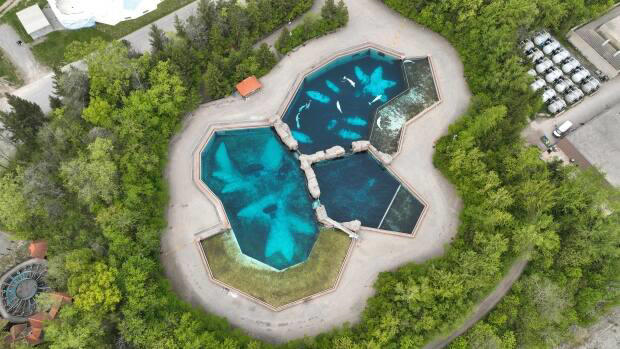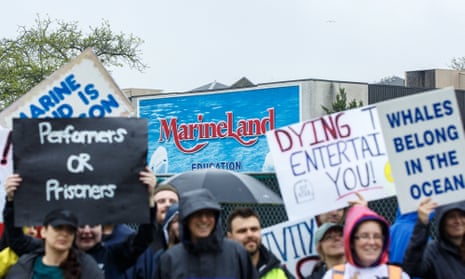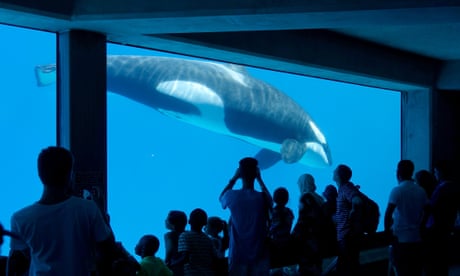After a decade-long legal battle, former Marineland trainer Philip Demers was able to see his beloved walrus Smooshi this week, after the Niagara Falls, Ont., tourist attraction dropped a $1.5-million lawsuit against its former employee.

Phil Demers worked at Marineland for 12 years before becoming an animal activist. Demers and the Niagara Falls, Ont., park have settled a decade-long legal battle that will see two walruses relocated.© Submitted by Phil Demers
Demers, the animal rights activist and whistleblower, is still banned from Marineland, but was allowed inside the park Wednesday for a reunion with Smooshi — the first time he had seen her in a decade, he said — after news emerged that the legal issues were resolved.
The lawsuit, filed in 2013 by Marineland, alleged Demers trespassed and plotted to steal the 800-pound walrus. Demers filed a counterclaim, also in 2013, for defamation and abuse of process, he told CBC Hamilton.
After several weeks of negotiations, both sides have dropped legal action and, as part of the mutual agreement, Smooshi and her calf Koyuk will be rehoused as soon as "reasonably possible" where "they can join other walruses."
In a news release issued Wednesday, Marineland said "litigation between Marineland … and Phil Demers has been resolved amicably... Mr Demers acknowledges Marineland's evolution towards education, conservation and research, and its commitment to enhanced animal care."
Demers said he would leave the exact location of where the walruses are going to Marineland to share publicly but that he agrees the new location is better.
"I'm incredibly pleased. I'm ecstatic," he said. "The contrast of where she's going now, and the fact she will no longer perform and she won't be under the blazing hot sun and she won't be separated from her baby anymore, which to me is probably the greatest piece of justice that that animal deserves."
Koyuk was born in June, 2021, but Demers said the two have been kept apart since Koyuk's birth so Smooshi could perform in shows.
The fight to free Smooshi
Demers was a Marineland trainer for 12 years before becoming a whistleblower and activist, shedding light on the conditions the animals were living in at the facility.
Demers said he decided to use the lawsuit to leverage the animals' release.
"It's been a tunnel vision-like experience for me. I've only ever thought about the walrus and the conflict with Marineland."
He said the settlement has taken a weight off him.
"There's a certain poetic justice to it all."
Marineland still in court
Demers's efforts aren't the only ones that have put Marineland in hot water for its use of animals.
The animal rights group Last Chance for Animals (LCA) filed complaints against the facility last year, saying videos showed illegal dolphin and whale shows.
Miranda Desa, a lawyer for LCA, said a 2021 video shows "dolphins performing tricks to music for an audience" and "beluga whales being instructed to perform tricks for food in front of on-watchers" but that Marineland refers to their shows as "educational presentations" to get around not having a licence.
Under a section of the Canadian Criminal Code introduced in 2019, captive cetaceans — large sea mammals such as dolphins and orcas — cannot be used "for performance for entertainment purposes" unless the performance is authorized with a licence from the Ontario government.
Niagara Regional Police told CBC Hamilton that the complaint resulted in Marineland being charged with the criminal offence related to the of "use cetacean for performance/entertainment without a licence" and that this charge is still before the courts.
Police said they have received additional complaints but as they are actively under investigation, police cannot provide further information.
Desa said Marineland will have its seventh court appearance on September 28 in St. Catharines, Ont.
As for Demers succeeding in having Marineland rehousing Smooshi and Koyuk, Desa said it is an important step in increasing awareness of "animals in captivity and the harms they suffer, especially at Marineland."
In its statement Wednesday, Marineland said it "has a historic obligation to care for the marine mammals in its care.
"Marineland must care for its animals and there is no simple or obvious solution to rehouse them."
The most important reunion
Demers called his reunion with Smooshi "powerful." He joked it was a red-carpet entrance, adding, "It was more like grey, dreary, concrete carpet."
He also tweeted a photo of himself being allowed back onto Marineland's grounds.
Demers said he plans to keep advocating for marine mammals in captivity, but for now, he's happy he caught his proverbial white whale in seeing Smooshi and Koyuk being freed from captivity.
Although he wasn't able to get really close to Smooshi Wednesday, he's hopeful it's just the beginning of a new chapter.
"The door for many more [visits] is wide open," he said. "I look forward to all of them."

















